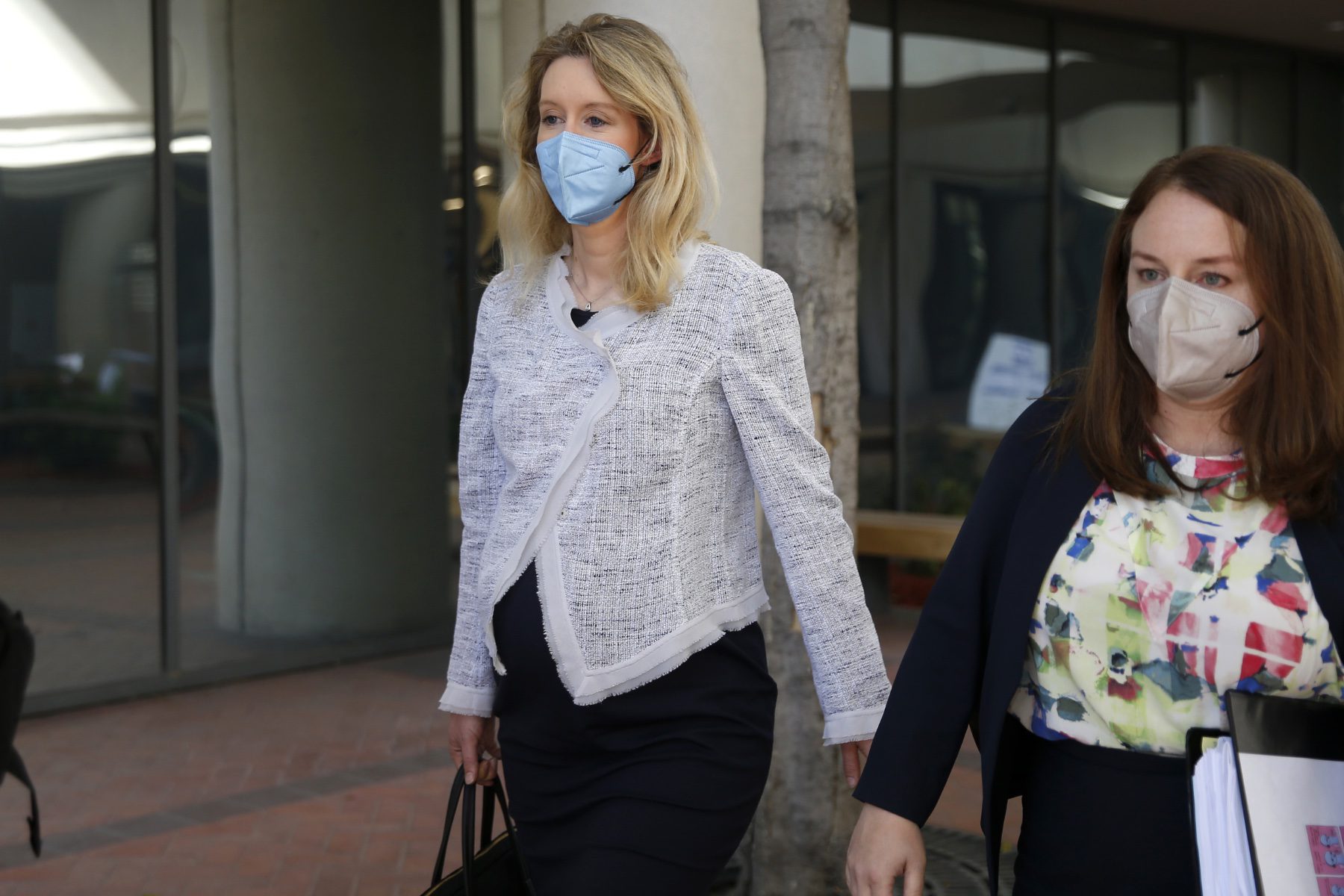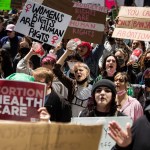This article was published in partnership with The Marshall Project, a nonprofit news organization covering the U.S. criminal justice system. Sign up for their newsletters, and follow them on Twitter, Instagram and Facebook.
Elizabeth Holmes is scheduled to turn herself in to federal prison in April, nearly six months after a jury convicted her of fraud for misleading Theranos investors. Holmes’ attorneys recently requested a delay to the start of her 11-year sentence, asking that she remain free while she appeals her conviction. Among the reasons cited that Holmes is not a flight risk: The fact that she “is the mother of two very young children.”
For the vast majority of women, being a parent is rarely considered a mitigating factor to keep them out of prison or jail. Roughly 173,000 women are incarcerated in the United States, with Black and Latino women held at roughly twice the rate of White women. Nearly 60% of women in prison are parents, according to the Prison Policy Initiative. The vast majority of women detained in local jails — roughly 80% — have children. And for some, parenthood begins behind bars, with 55,000 pregnant women incarcerated each year. These women may have only hours with their newborn before they are separated and returned to prison or jail.
Separating mothers from their children has devastating consequences for both parties, research shows. Prisons and jails are ill-equipped to deal with the physical and emotional challenges of pregnancy and the vulnerable period after birth. Mothers who wind up in prison are far more likely than their male counterparts to have their parental rights permanently terminated. And parental incarceration is considered by public health experts to be an adverse childhood experience that can inflict lifelong harm on children’s health and well-being.
So, some states are starting to rethink the practice of incarcerating parents. Twelve states now have laws to reduce the impact of parental incarceration, according to an analysis by the Prison Policy Initiative. These legislative efforts include requirements that parents be detained closer to home or programs to divert parents from prison or jail altogether. Many formerly incarcerated women advocating for these bills say they are a good first step to reducing the collateral traumas of incarceration.
-
More from The 19th
- Senate bill aims to improve care for pregnant women and babies in federal prisons
- Success of ‘slavery on the ballot’ measures could help incarcerated pregnant people of color
- Fueled by family experiences with incarceration, Black Girls Rising seeks to close youth prisons in Louisiana
When Andrea James went to prison in 2010, her second child was only 5 months old. James was convicted of wire fraud and spent two years in a federal facility. Like Holmes, James points out that she hardly represents most women behind bars. She had a successful legal practice before prison, excellent legal counsel and a supportive family network. But even these privileges could not protect her from the indignities of spending her first months postpartum at FCI Danbury in Connecticut.
“I walked into prison leaking from every orifice of my body,” she said. “We only had these little baby pads. There were no tampons unless you could buy them. It was the women who came to my support and brought me clean underwear.”
The first few months after birth are critical. Proponents of ending the incarceration of women and girls say locking women up so soon after giving birth puts them at risk. Some of the challenges are physical. At FCI Danbury, James said the women rarely had soap in the bathrooms or adequate access to feminine hygiene products. New mothers may struggle to deal with their breast milk if the facility does not offer pumps or a freezer to safely store the milk before it can be transported to their baby.
Other challenges are mental and emotional. Post-pregnancy, women are adjusting to a cascade of hormones that can profoundly affect their mood. Birthing parents are typically assessed for postpartum depression at their six-week checkup. But the hormonal shifts last for months, especially if weaning a baby, said Dr. Jackie Abdalla, who has spent the last two years as a physician at Sacramento County Main Jail in California. Outside prisons or jails, people may have an easier time taking care of themselves, seeking treatment or leaning on their support network to get through the rough patches. Behind bars, the avenues for self-care are limited, and new moms are also dealing with the added emotional stress of being separated from their babies.
“Being in a jail setting where you are confined, isolated and don’t have access to your baby, to the outdoors or too much socialization can exacerbate postpartum depression or postpartum psychosis,” Dr. Abdalla said.
People who give birth in prison may only have a few hours to bond with their babies. A 2019 documentary from Frontline and The Marshall Project chronicled the emotional toll of saying goodbye to a newborn. Pregnant women incarcerated at Tutwiler Prison in Alabama spend only 24 hours with their baby before returning to prison. “When you are locked up your whole pregnancy, and it was just you and that baby, and then to walk away from the person that’s been there with you, it makes the strongest person break,” one woman said.
For many of these women, the separation is permanent. Mothers behind bars are more likely than incarcerated fathers to be single parents, research shows. When they go to prison, their children may be sent to live with relatives or placed in the foster care system. For many mothers, going to prison, even for a short stint, means saying goodbye to their children forever, a Marshall Project investigation found. Incarcerated parents whose kids are placed in foster care, but have never been convicted of child neglect or abuse, are more likely to lose their parental rights than parents who abuse or assault their children.
At FCI Danbury, James remembers watching women fall to their knees as they dealt with the weight of loss and longing. For many of the women, she said, the last time they saw their children “was looking out the back window of a law enforcement vehicle.”
“Women would be mopping the floor or cleaning the bathroom, and we would just find them crumpled on the floor, inconsolable,” she said. “The pressure of being separated from your kids and your community would hit us all from time to time.”
These experiences led James to found the National Council for Incarcerated and Formerly Incarcerated Women and Girls, a nonprofit organization that works to keep women and girls out of prison and jail. As part of her mission, James has helped formerly incarcerated women in several states draft and lobby for primary caretaker legislation designed to keep the bond between a parent and child intact.
Florida, Hawaii, New York, Missouri and the federal system now require parents to be incarcerated within a specified distance of their kids, making visitation easier. And eight states, including Illinois, Tennessee, and Louisiana, require that a person’s status as the sole caregiver be considered a mitigating factor during sentencing, or that parents are given priority access to alternatives to incarceration. Lawmakers in Connecticut, Maine and Rhode Island are considering similar legislation.
One such program in Minnesota is designed to support incarcerated mothers in the first year after giving birth. A decade of research on pregnant women in Minnesota’s prison showed that most are released within one year of the birth of their baby, said Rebecca Shlafer, an associate professor in the Department of Pediatrics at University of Minnesota Medical School. Through her work with the Minnesota Doula Project, which supports pregnant women in prison, Shlafer saw many women give birth and say goodbye to their newborn baby, only to return home before the child’s first birthday.
“We felt there was this unnecessary separation between moms and their infants,” she said. “And that separation was a tremendous insult to the attachment relationship that is the foundation of all healthy relationships.”
Under Minnesota’s Healthy Start Act, signed into law in May 2021, the commissioner of corrections can place pregnant women or new moms into a community alternative, such as a halfway house, while also providing a plan for drug treatment or additional support, if needed. Pregnant women are eligible for such accommodation for the duration of their pregnancy and for up to a year after giving birth.
Programs such as these will be cold comfort to Holmes, who was sentenced in the federal system. Federal legislation caps distance allowed between incarcerated parents and their families. But federal judges do not have to consider parental status during sentencing. Some women who give birth while in federal prison can participate in the Bureau’s Residential Parenting Program, which allows mothers to bond with their newborn for up to three months in a community setting before returning to prison to complete their sentence.
The government opposes Holmes’ request to delay. Attorneys for the Northern District of California said they have already given Holmes a break, granting nearly six months for self-surrender because she had informed the court she was pregnant with her second child while awaiting a sentencing date.
“There are not two systems of justice — one for the wealthy and one for the poor — there is one criminal justice system in this country,” they wrote. “And under that system, the time has come for Elizabeth Holmes to answer for her crimes committed nearly a decade ago.”
James has a different perspective. Decades of research and her time in federal prison have made clear that incarceration is devastating to mothers and their children. Privilege, economic or otherwise, cannot shield them from the trauma of separation borne out of imprisonment.
“We write these bills in support of our sisters who are just trying to make it day to day, but I don’t give a damn who you are,” James said. “You could be a billionaire. When it comes to Elizabeth Holmes, sending her to a federal prison is not the answer. She has small children.”





